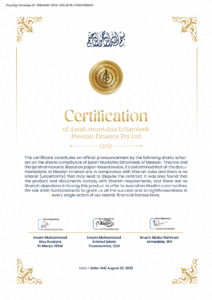Meezan Invest engages with IdealRatings who filter out any shares that are not shariah-compliant from the investment universe in accordance with their Shariah Rulebook and Methodology agreed to between IdealRatings Inc (IdealRatings) and ISRA International Consulting Sdn Bhd (ISRA Consulting). Lifespan then use the remaining investment universe to build the direct share component of the portfolios. IdealRatings will also review the holdings of any Exchange Traded Funds that we wish to use to ensure that they have enough of their portfolio invested in Sharia Compliant investments in accordance with the Shariah Rulebook and Methodology agreed to between IdealRatings and ISRA Consulting. Then, Meezan Invest, in conjunction with Lifespan Financial Planning acting as an asset consultant for Meezan Invest, selects investments from the remaining assets to build a portfolio that is predominantly made up of growth and alternative investments, including Australian and International shares, ETFs, property and infrastructure, alternatives and Gold. The portfolio will also have a small allocation to cash which will pay a small amount of interest. The interest on the cash is non-permissible and there will also be small amounts of income from the investment investments within the investment universe that are non-permissible. Periodically, we will go through a purification process where we, with the assistance of IdealRatings, determine how much non-permissible income has been generated by the portfolio and we will write to each investor to advise them of how much non-permissible income was generated to allow them to purify this income by making a donation to a charity of their choice. More information about the Shariah Rulebooks and Methodologies used including the purification process can be found below. The proposed assets to be included in the final portfolio will finally be certified as Shariah-Compliant by ISRA Consulting after they have reviewed the final investments that we select after IdealRatings’ screening process.
Due to your requirement for a Sharia compliant portfolio, Lifespan cannot allocate to traditional defensive asset classes such as fixed interest and cash over a certain amount. Therefore, we replaced these asset classes by a larger allocation to Gold, alternatives, other commodities, REITS and in some cases by having a higher allocation to shares than we would normally have in the portfolio. Lifespan view these assets as Growth assets which are riskier than fixed interest and as such your portfolio will carry a higher risk and experience higher volatility than a standard portfolio.
There are Sharia Compliant investments that are put forward as defensive that invest in Sharia Compliant arrangements which are unlisted, unrated and are generally private funding and profit share arrangements between unlisted and unrated businesses. Our view is that these investments are not defensive and carry significant risks which is why we choose not to use them and prefer more traditional growth investments instead even if the portfolios become more volatile.
Where possible, Lifespan will seek diversification of stocks and sectors. Our approach seeks to maximise risk adjusted returns for the portfolio such that the portfolio outperforms in the medium and long term. Lifespan will assess the economic cycle by using a range of macro and micro economic indicators but remains style neutral. We will also use both qualitative and quantitative inputs to understand the drivers and risks of market sentiment, especially in periods where valuations are at extreme levels. Our preference is for Mid and Large cap companies. Finally, considering all the above we will select the stocks to include in the portfolios.
Shariah Screening Methodologies for Equities, REITs and ETFs
IdealRatings Inc (IdealRatings) conducts screening on the Global Equities, real estate investments trusts (REITs) and selected exchange-traded funds (ETFs) in accordance with the Shariah Rulebook and Methodology agreed to between IdealRatings and ISRA International Consulting Sdn Bhd (ISRA Consulting). ISRA Consulting as its Shariah Adviser certifies and provides the Shariah Pronouncements of the investments for them to comply with the Shariah Rulebook.
In general, the Islamic Finance Methodology to screen Compliant Equities and REITs stipulates that Investments are not permitted in stock of a company, which belongs to any of the following industries, or whose operating revenue derived from the prohibited activities listed below (i.e. non-permissible income) which exceeds 5% of its cumulative total income.
There are four (4) key areas of screening for shariah compliance and they are:
(1) Business Screening.
(2) Financial Ratio screening.
(3) Non-Permissible Income screening.
(4) Preferred Shares.
Business Screening
Investment is prohibited in companies whose primary operation in non-permissible business activities including but not limited to:
- Adult Entertainment
- Alcohol
- Cinema
- Conventional Financial Services
- Defence/Weapons
- Gambling/Casino
- Music
- Pork related products
- Tobacco
Financial Screening
In addition to the business activities screening, Islamic Finance requires the following financial screening of the listed companies:
- Total amount of interest-bearing debt, not to exceed the rulebook percentage of the total assets or market-cap, of the company
- Total amount of interest-bearing cash deposits, not to exceed the rulebook percentage out of the total assets or market-cap, of the company
- No investment in trust units is allowed
- No investment in any derivatives is allowed
Non-Permissible income – income derived from the non-permissible sources should not exceed 5%.
Preferred Shares – No investment in fixed income preferred shares is allowed.
A listed company’s business and financial position could change over time and such changes could affect both the shariah compliance of the company and relative “purification” percentage. These changes could reflect changes in financials as well as income.
ETF Screening Methodology:
The screening process will entail screening each constituent of the ETF Index, based on the Shariah guidelines/Rulebook adopted by the Asset Management Company, for its Equities Shariah Screening Rulebook. As such, the 1st step of the ETF screening process, IdealRatings will screen each constituent in the Index of the ETF. The result will be an Index Constituent pass/fail list.
In addition, the 2nd step of the screening process would be analyzing Index Constituent Fail List such that the total weight of non-compliant stocks within the index tracked by ETFs should not exceeds certain threshold (e.g. 33%) of the index weights.
Purification Process
The disposal of the prohibited income generated from the dividends distribution for non-compliant companies is a must and therefore, Purification for the ETFs is necessary.
Purification Methodology
IdealRatings, Inc. (IdealRatings) is responsible to ensure all securities provided to Lifespan are screened according to the AAOIFI Shariah Rulebook, as required by its client. Meanwhile, ISRA International Consulting Sdn. Bhd. (ISRA Consulting) is responsible to form an independent opinion, as to whether the Shariah screening process carried out by IdealRatings follows the AAOIFI Shariah Rulebook.
In respect of the meeting held on Tuesday 29th November 2022 between ISRA Consulting and IdealRatings, the following points have been discussed regarding the Lifespan purification methodology to be applied for the Equities, REITs, and ETFs:
- Lifespan purification customers` modelled portfolios should follow the Dividend purification methodology for all three asset classes for REITs, Equities and ETfs.
- Considering point one, the following rulebooks will be used for each asset class:
- Equities purification: calculations will be conducted using the AAOIFI rulebook and applying Dividend purification, instead of investment.
- REITs purification: calculation will be conduced using the IdealRatings REITs rulebook and applying Dividend purification.
- ETF purification: calculation will be conducted using IdealRatings ETFs rulebook and applying Dividend purification as a weighted sum of the non-permissible income ratio of the ETF`s holdings at the dividend`s distribution date multiplied by the ETF dividend.
- ((Weighted sum of Holding`s Non-Permissible Income))/((Weighted sum of Holding`s Total Income)) x Dividend
- The purification calculation will be held for each asset class separately based on the type of each asset class and then Lifespan can calculate the portfolio`s total amount of purification through the summation of each asset class amount, including ETF.
| Asset Class | Company | Dividend | Quantity | Purification Ratio | Purification |
| Equity | Apple Inc | 1 | 10 | 3.31% | 0.331 |
| REITs | Goodman Property Trust | 5 | 10 | 0.46% | 0.23 |
| ETF | Ishares Biotechnology ETF | 3 | 10 | 0.5% | 0.15 |
Accordingly, the Equities, REITs, and ETF amount of purification would be the sum of purifications: 0.331+0.23+0.15=0.711
In the event Lifespan is doing quarterly Purification, once the one portfolio purification is calculated, the rest of the portfolio purification should be factored into the AuMs of the first portfolio calculated per quarter. As an example, if the portfolio size is 1000 AUD and the second portfolio size is 2000 AUD then the purification calculation for the second portfolio is: 0.711*2000/1000=1.422



